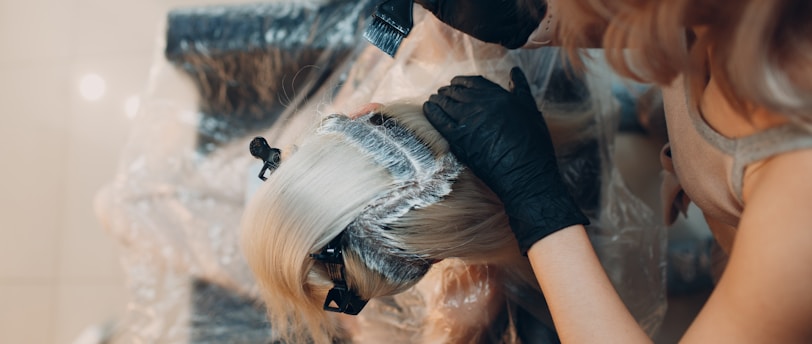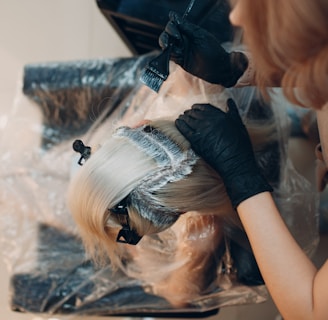
Top 10 Organic Hair Dye Brands Vibrant Look | Safety and Benefits
When it comes to working with food, having a Food Hygiene Certificate is benificial but how long does a Food Hygiene Certificate last, and when is it time for renewal? In this comprehensive guide, we will explore all the important factors related to food hygiene certificates and their validity.
7 min read
Understanding the term "Plant based Organic Hair dye":
If you are looking for Organic and natural hair dye, it's important to know know how to find it because let's be honest, our hair has a huge impact on our personality so firstly, know that not all plant-based hair dye is automatically organic. Due to the lack of strict regulation in the beauty industry, it is crucial to understand the nuances of the term "organic".
Here's why:
"Plant-based" simply refers to the source of the coloring ingredients: These ingredients come from plants instead of synthetic chemicals.
"Organic" has a specific meaning: It generally refers to products that are grown and processed without the use of synthetic fertilizers, pesticides, or genetically modified organisms (GMOs).
Therefore, a plant-based hair dye could still contain non-organic ingredients such as:
Chemically processed plant extracts: While derived from plants, they might undergo chemical processing that removes them from being considered "organic."
Other non-organic additives: These could include stabilizers, preservatives, or fragrances that fall outside the definition of organic.
How to find a plant based real natural and organic hair dye:
Here's how to determine if a plant-based hair dye is organic:
Look for certifications: Look for labels that say "USDA Organic" or "COSMOS Organic," or Soil Association Certification: These are well-established certification body in the UK and abroad that certifies organic products, including cosmetics.
Read the ingredient list: Check if the listed ingredients are clearly labeled "organic."
Contact the manufacturer: If unsure, directly contact the brand for clarification on their organic claims.
Remember, being "plant-based" does not guarantee organic certification. Always scrutinize labels and seek additional information to ensure you are using a truly organic product, if that's your preference.
Best Natural and Organic Hair Dye:
As also mentioned above, the terms "natural" and "organic" lack strict regulation in the beauty industry, so certain hair dyes prioritize plant-derived ingredients, avoiding harsh chemicals found in traditional dyes. These dyes, often marketed as "natural" or "organic," are appealing to those with sensitive scalps or health concerns.
Examples of Popular Hair Dyes Focusing on Natural Ingredients:
Henna: A natural plant-based dye used for centuries, available in various shades. It adds highlights, lowlights or covers grays. However, achieving specific shades may require multiple applications and a strand test is crucial due to potential reactions with other chemicals.
Indigo: As with henna, indigo is another natural plant-based dye that produces shades of blue and black. The color can be created using it alone or in combination with henna to create a variety of brown and black hues.
It's essential to note that while marketed as "natural" or "organic," these dyes may still contain non-natural ingredients. Carefully reading the ingredients list and consulting with healthcare professionals, especially for sensitive skin or scalp conditions, is crucial.
Popular Branded Organic Hair Dye for Men on selves:
Appealiing to individuals with sensitive scalps or health concerns. Listed below are five noteworthy options for natural hair dye for men:
Madison Reed Men's Color Depositing Shampoo: A convenient and gentle choice that gradually deposits color over time. Enriched with ingredients like ginseng, quinoa, and biotin, it not only adds color but promotes healthy hair. Importantly, it avoids ammonia, parabens, and sulfates.
Just for Men Natural Hair Color: Tailored for men, this brand offers various shades using a natural formula without ammonia, parabens, and sulfates. Ideal for covering grays or seamlessly blending them into your natural color.
L'Oreal Men Expert Color Soother Hair Dye: Designed for gentle care, it incorporates wheat germ oil and vitamin E to nourish and condition the hair. With a range of shades, it's free from ammonia, parabens, and sulfates.
Earthtones Hair Color: A plant-based hair color with ingredients like henna, indigo, and cassia. Versatile in application, it covers grays, adds highlights, or creates lowlights. However, caution is needed as henna can react with other chemicals; hence, a strand test is recommended.
Naturtint Hair Color: Comprising mostly plant-based ingredients, this hair color is ammonia, paraben, and resorcinol-free. Offering a diverse shade range, it's suitable for covering grays or experimenting with highlights and lowlights.
Popular Branded Organic Hair Dye for Women on selves:
For women who want to dye their hair with naturally based ingredients, here are five options worth trying.
Khadi Natural Hair Color: This plant-based hair color is free from harsh chemicals like ammonia, parabens, and PPD. Using natural ingredients like henna and indigo, it comes in various shades, from vibrant reds to deep blacks. Achieving specific shades may require multiple applications, and a strand test is essential.
Madison Reed Radiant Hair Color Kit: An ammonia-free, cruelty-free kit formulated with ingredients like keratin and coconut oil. It covers a wide range of shades, offering good gray coverage.
Naturtint Hair Color: Mostly plant-based, free from ammonia, parabens, and resorcinol, it provides subtle coloring results compared to traditional dyes.
Oway Henu Cream Hair Color: This ammonia-free, PPD-free option uses natural ingredients like henna, indigo, and organic plant extracts. With a focus on browns and reds, it's suitable for subtle color enhancements or covering grays.
Logona Hair Color: A certified organic, plant-based hair color free from ammonia, parabens and PPD. Using natural ingredients like henna, indigo, and beetroot. It comes in various shades and like Khadi Natural Hair Color, achieving specific shades may require multiple applications, necessitating a strand test.
Selecting the right hair dye depends on individual factors such as hair type, desired color outcome, and sensitivities. It's advisable to conduct a strand test before trying any new product and seek guidance from a hairstylist for personalized recommendations.
Pros and Cons of Organic Hair Dye:
The suitability of "organic" hair dye depends on individual needs and priorities. Here's a breakdown of potential advantages and disadvantages:
Potential Benefits:
Gentler on Hair and Scalp: Many organic dyes exclude harsh chemicals, benefiting those with sensitive scalps or concerns about hair health.
Reduced Allergic Reactions: With fewer potential allergens, organic dyes may lower the risk of allergic reactions.
Environmentally Friendly: Often produced with plant-derived ingredients, organic dyes prioritize eco-friendly practices.
Potential Drawbacks:
Limited Color Options and Intensity: Organic dyes may not offer the same vibrant colors as traditional dyes, better suited for subtle enhancements or grays.
Less Predictable Results: Achieving specific color outcomes, especially for lighter shades, can be challenging and may require multiple applications.
Potential for Staining: Natural ingredients like henna may stain hair and skin, requiring caution during application.
Higher Cost: Organic dyes can be pricier compared to traditional options.
The decision to opt for organic hair dye is personal. If prioritizing gentle ingredients and reduced irritation is essential, organic dye may be preferable. However, for a broader color range and predictable results, traditional dyes might be more suitable. Thorough research, understanding potential pros and cons, and consulting professionals are key steps.
Safety and Precautions to be taken while using Organic Hair Dyes:
While the term "organic" often gives a sense of safety, it's important to recognize that even organic hair dye contains chemicals and potential risks. Here are some practical steps to ensure your safety when using organic hair dye:
Before applying:
Patch test: Prior to applying the dye to your entire head, conduct a patch test 48 hours in advance. Apply a small amount behind your ear or on your inner forearm and keep an eye out for any reactions such as redness, itching, or swelling.
Read instructions carefully: Pay close attention to the instructions given by the brand box, including mixing ratios, application times, washing and safety warnings e.t.c.
Check for allergies: If you have known allergies to certain ingredients, even if they're labeled as "natural," it's wise to avoid the dye and seek advice from a dermatologist beforehand.
Pregnancy and breastfeeding: Although ongoing research is being conducted, it's generally recommended to consult with a healthcare professional before using any hair dye during pregnancy or breastfeeding.
During application:
Wear gloves: Safeguard your hands from potential irritation or staining by wearing gloves during the application process.
Ventilation is key: Apply the dye in a well-ventilated area to minimize the inhalation of fumes, especially if you have respiratory sensitivities.
Protect eyes and mucous membranes: Be extra cautious to avoid getting the dye in your eyes or on your mouth.
Clean up spills promptly: If there are any spills on your skin or surfaces, wash them off immediately with soap and water.
After application:
Follow aftercare instructions: Different dyes may require specific aftercare routines, such as using a color-safe shampoo or conditioner.
Monitor for reactions: Keep an eye out for any discomfort, burning, or irritation. If you experience any of these, discontinue use and consult a doctor or dermatologist.
Remember, the term "organic" doesn't guarantee complete safety. Always prioritize your well-being and seek advice from a healthcare professional if you have concerns or pre-existing conditions.
Conclusion:
To find a genuine organic and natural plant-based hair dye, it's crucial to know that not all plant-based dyes are automatically natural due to relaxed beauty industry regulations. Look for certifications like "USDA Organic" or "COSMOS Organic" and carefully check the ingredient list. The term "plant-based" doesn't guarantee organic certification.
Natural and organic hair dyes prioritize plant-derived ingredients, avoiding harsh chemicals found in traditional dyes. Indigo is a natural plant-based dye, often combined with henna for various brown and black hues.
Some popular organic hair dye options for men include Madison Reed Men's Color Depositing Shampoo, which deposits color gradually and promotes healthy hair. Organic dyes are gentle on the hair and scalp, suitable for sensitive scalps. However, they can be more expensive than traditional options.
Despite the term "natural," even organic hair dye contains chemicals and potential risks. It's advised to conduct a patch test 48 hours before application to ensure safety. When using organic skincare products, be vigilant for any discomfort, burning, or irritation and consult a doctor if concerns arise.
More Articles:
GOTS Approved Organic Cotton Bedding









